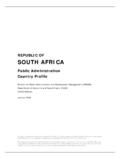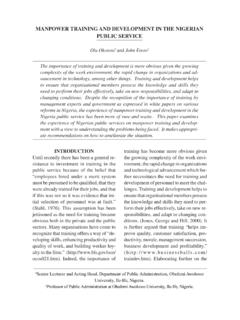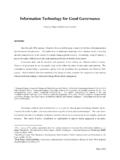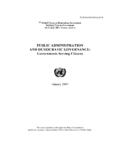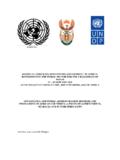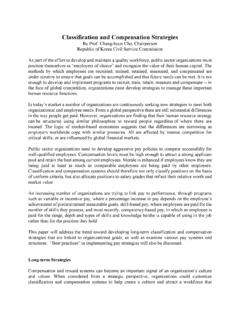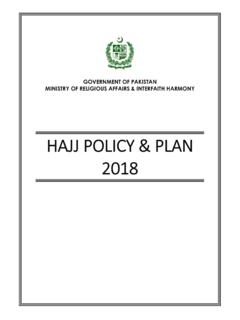Transcription of The Management of Hajj Operations - United Nations
1 AFRICAN TRAINING AND RESEARCH CENTRE IN ADMINISTRATION FOR DEVELOPMENT TANGIER (MOROCCO) THE Management OF hajj Operations Series: Studies and Documents N' 10, Vol. 1 1999 Content No 10 1999 Pages 1 Forward Mohammad Ahmad Wali 5 The Management of hajj Operation in Sudan. Osman El-ZubairAhmed and El Nour Khalifa Wida 29 The Management of hajj Operation in Nigeria Tijjani Muhammad and Sitehu Salihu Muham 49 The Management of hajj Operation in Britain Kashifa Mahmood FORWARD This publication, entitled, THE Management OF hajj OPERATION is the outcome of a research project conducted by CAFRAD in some African countries and Britain to bring into focus an important area of study, hoping that it may have some policy implications.
2 This first volume focuses on SUDAN, NIGERIA AND BRITAIN while the second volume concentrates on Gabon, Libya and Morocco. hajj is the annual pilgrimage to Makka (Saudi Arabia) by Muslims of all races, from the Four Corners of the Earth. Every year, for over fourteen hundred years since the farewell pilgrimage of the Prophet Mohammad (PBUH), millions of Muslims, men and women, have ga-thered for the same ritual, which can be described as the greatest gathering of mankind. hajj is one of the five fundamental pillars of Islam. The other four pillars are belief in God and His Prophet, Mohammad (PBUH), five obligatory daily prayers at appointed times, fasting in the month of Ramadan for 29 or 30 days and alms giving.
3 hajj is obligatory once in a lifetime, upon male and female adults who are physically and mentally fit and have the means to perform it. It has been observed as a course of spiritual enrichment and moral rearmament, a course of intensified devotion and a disciplinary experience, a course of humanitarian interest and inspiring knowledge. Of all the five fundamental principles of Islam, only hajj is performed in a specific place - Makka. Thus, millions of Muslims assemble in one place (Makka), at the same time, between 8th and 13th Zul-Hijjah (the 12th month of Muslim lunar calendar) to perform religious rites. In other words, the rituals of hajj are performed within six days. On the first day, which is the 8th of Zul-Hiijah, pilgrims move out of Makka to Mina, a small uninhabited village east of the city, meditating and praying.
4 On the second day, the 9th of Zul-Hijjah, pilgrims leave Mina for plain of Arafat, where they stay for the most important rituals of hajj until sunset. After the Sunset, they proceed to Muzdalifah, an open plain, where they spend the night. On the third day (10th Zul-Hijjah), they leave Muzdalifah very early in the morning for Mina, where they would stay for the next three or four days (10th, 11th and 12th or and 13th Zul-Hijjah) performing the remaining rituals of Haij. AL the end of hajj rites or before the start of hajj , pilgrims visit the Mosque of the Prophet at Madina. This, in brief, is the most spectacular religious event everywhere in the world. Pilgrims arrive Saudi Arabia by road, sea and air every year.
5 On arrival, pilgrims are transported either to Makka or Madina, depending on the date of arrival. While in Makka or Madina, pilgrims are accommodated either in private lodges or hotels, depending on the choice and financial means. All these arrangements are made, in most cases, before pilgrims arrive Saudi Arabia. In countries where governments participate in the Management of hajj operation, the send their officials to Lake care of the needs of their pilgrims, notably guidance and medical services, even though the Saudi authorities provide medical services to all pilgrims. Wherever the pilgrims go, they are accompanied by their officials for support. However, before travelling to the Holy-Land, intending pilgrims have to go through various organizations in their respective countries, fulfilling one requirement or another: from agencies responsible for pilgrims welfare, travel agents, visa authorities, health agencies to immigration and banks.
6 Fulfilling these requirements is by no means a easy task. It requires sufficient preparations on the part of intending pilgrims, and thorough planning on the part of organizers of pilgrimage Operations . Besides, co-ordination is required from the start to the en, and from home and in the Holy-Land. To this extent, Management of hajj operation can be categorize into three broad phases: phase one is about all necessary planning and preparation at home by Haij organizers and intending pilgrims before departure to Saudi Arabia. Phase two is about all procedures an processes while in the Holy-Land, which enable intending pilgrims to perform hajj , whereas phase three is about all steps taken to facilitate smooth return of pilgrims to their respective countries and destinations, after they had performed the pilgrimage.
7 Under phase one, preparation at home takes much longer I than in all the other phases. It takes between five and six months more of preparation before departure to Saudi Arabia. For intending pilgrims, preparation starts with paying of their travel cost (international travel and local travel while in the Holy-Land), paying for accommodations in Saudi Arabia, satisfying the health requirement, getting vellers cheques or foreign exchange and obtaining visas. Under phase two and three, intending pilgrims are now in the territory of Saudi Arabia and have to observe hajj rules and guidelines during and after the hajj . At each phase, enormous skills, competence, experience, ca city, knowledge, efficiency, human relations and patience are required for effective Management of hajj operation.
8 Religious scholars, administrators, immigration and security personnel, health officials and host of other officials are all involved in the conduct of hajj operation and in ensuring its success. In the process of managing the hajj operation, problems are encountered and, in spite of years of experience in the organization of Haij in Africa, the problems seem to be recurring. What are the problems and how can they be addressed are the subjects of investigation of the research. The researchers (Ahmed & Widatalla for Sudanese case, Bande and Muhammad for Nigerian case and Mahmood for British case) have traced the development of hajj Operations in the respective countries, examined the capacity and degree of efficiency of the organizations responsible for hajj and other supporting organizations, notably immigration, airlines, visa authorities, health agencies and banks.
9 They have considered Saudi regulations on hajj , transport in the holy Land, housing in Makka and Madina, the stay at Mina and Arafat. They found out that while some problems are common in all the three countries, others are different and peculiar to each country. Whereas in Nigeria and Sudan Governments participate actively in the Management of hajj operation, in Britain, it is the private sector without any Government involvement. This, in a way, provides a comparative perspective between African and non-African countries in the Management of Haij operation. As we move into the next millennium, Management of Haij operation needs to be re-examined critically with a view to enhancing the situation. Management of pilgrimage affairs has come a long way, but only very little of it has been studied.
10 The problem may not be un-connected with the nature of hajj itself: hajj , fundamentally, is a religious affair, and drawing the line between where the rituals stops and where the Management starts is a difficult enterprise. It requires complex analytical tools to overcome the problem. This study attempts to focus on the Management side. Whatever may be the case, there is an urgent need for social sciences to make important contribution towards facilitating the conduct of pilgrimage operation. The way forward has been provided by the researchers to improve the quality of Management of hajj affairs in Africa and Europe. I am confident that readers will find the research findings interesting and provocative.
